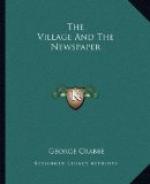Or should we sing the subject of the day,
To-morrow’s wonder puffs our praise away.
More blest the bards of that poetic time,
When all found readers who could find a rhyme;
Green grew the bays on every teeming head,
And Cibber was enthroned, and Settle read.
Sing, drooping Muse, the cause of thy decline;
Why reign no more the once-triumphant Nine?
Alas! new charms the wavering many gain,
And rival sheets the reader’s eye detain;
A daily swarm, that banish every Muse,
Come flying forth, and mortals call them news:
For these, unread, the noblest volumes lie;
For these, in sheets unsoil’d, the Muses die;
Unbought, unblest, the virgin copies wait
In vain for fame, and sink, unseen, to fate.
Since, then, the Town forsakes us for our foes,
The smoothest numbers for the harshest prose;
Let us, with generous scorn, the taste deride,
And sing our rivals with a rival’s pride.
Ye gentle poets, who so oft complain
That foul neglect is all your labours gain;
That pity only checks your growing spite
To erring man, and prompts you still to write;
That your choice works on humble stalls are laid,
Or vainly grace the windows of the trade;
Be ye my friends, if friendship e’er can warm
Those rival bosoms whom the Muses charm;
Think of the common cause wherein we go,
Like gallant Greeks against the Trojan foe;
Nor let one peevish chief his leader blame,
Till, crown’d with conquest, we regain our fame;
And let us join our forces to subdue
This bold assuming but successful crew.
I sing of news, and all those vapid sheets
The rattling hawker vends through gaping streets;
Whate’er their name, whate’er the time they fly,
Damp from the press, to charm the reader’s eye:
For soon as Morning dawns with roseate hue,
The herald of the morn arises too;
post after post succeeds, and, all day long,
gazettes and ledgers swarm, a noisy throng.
When evening comes, she comes with all her train;
Of ledgers, chronicles, and Posts again.
Like bats, appearing when the sun goes down,
From holes obscure and corners of the town.
Of all these triflers, all like these, I write;
Oh! like my subject could my song delight,
The crowd at Lloyd’s one poet’s name should raise,
And all the Alley echo to his praise.
In shoals the hours their constant numbers bring,
Like insects waking to th’ advancing spring;
Which take their rise from grubs obscene that lie
In shallow pools, or thence ascend the sky:
Such are these base ephemeras, so born
To die before the next revolving morn.
Yet thus they differ: insect-tribes are lost
In the first visit of a winters frost;
While these remain, a base but constant breed,
Whose swarming sons their short-lived sires succeed;
No changing season makes their number less,
To-morrow’s wonder puffs our praise away.
More blest the bards of that poetic time,
When all found readers who could find a rhyme;
Green grew the bays on every teeming head,
And Cibber was enthroned, and Settle read.
Sing, drooping Muse, the cause of thy decline;
Why reign no more the once-triumphant Nine?
Alas! new charms the wavering many gain,
And rival sheets the reader’s eye detain;
A daily swarm, that banish every Muse,
Come flying forth, and mortals call them news:
For these, unread, the noblest volumes lie;
For these, in sheets unsoil’d, the Muses die;
Unbought, unblest, the virgin copies wait
In vain for fame, and sink, unseen, to fate.
Since, then, the Town forsakes us for our foes,
The smoothest numbers for the harshest prose;
Let us, with generous scorn, the taste deride,
And sing our rivals with a rival’s pride.
Ye gentle poets, who so oft complain
That foul neglect is all your labours gain;
That pity only checks your growing spite
To erring man, and prompts you still to write;
That your choice works on humble stalls are laid,
Or vainly grace the windows of the trade;
Be ye my friends, if friendship e’er can warm
Those rival bosoms whom the Muses charm;
Think of the common cause wherein we go,
Like gallant Greeks against the Trojan foe;
Nor let one peevish chief his leader blame,
Till, crown’d with conquest, we regain our fame;
And let us join our forces to subdue
This bold assuming but successful crew.
I sing of news, and all those vapid sheets
The rattling hawker vends through gaping streets;
Whate’er their name, whate’er the time they fly,
Damp from the press, to charm the reader’s eye:
For soon as Morning dawns with roseate hue,
The herald of the morn arises too;
post after post succeeds, and, all day long,
gazettes and ledgers swarm, a noisy throng.
When evening comes, she comes with all her train;
Of ledgers, chronicles, and Posts again.
Like bats, appearing when the sun goes down,
From holes obscure and corners of the town.
Of all these triflers, all like these, I write;
Oh! like my subject could my song delight,
The crowd at Lloyd’s one poet’s name should raise,
And all the Alley echo to his praise.
In shoals the hours their constant numbers bring,
Like insects waking to th’ advancing spring;
Which take their rise from grubs obscene that lie
In shallow pools, or thence ascend the sky:
Such are these base ephemeras, so born
To die before the next revolving morn.
Yet thus they differ: insect-tribes are lost
In the first visit of a winters frost;
While these remain, a base but constant breed,
Whose swarming sons their short-lived sires succeed;
No changing season makes their number less,




